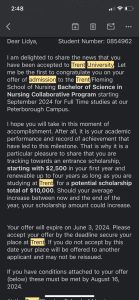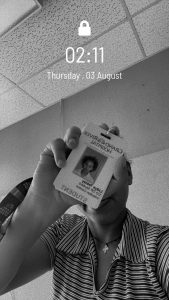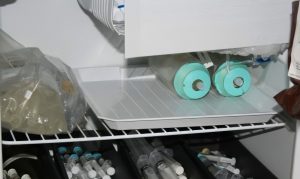Artifacts
Artifacts # 1
Trent nursing acceptance program

When I first discovered that I had been accepted into Trent University’s Collaborative Nursing Program, I was both surprised and overjoyed. Having applied to six universities, I was thrilled to receive my first offer from Trent. Initially, I had doubts about whether any university would accept me. However, receiving Trent’s offer significantly boosted my confidence. In the end, I was accepted into five out of the six programs I applied for, which filled me with immense pride and a renewed sense of potential. Choosing which university to attend was a challenging decision. Ultimately, I chose Trent University because it offers clinical placements starting in the first year, which aligns perfectly with my preference for hands-on learning. Additionally, I found Trent’s campus to be stunning and well-suited to my needs. I have no regrets about my decision, as I firmly believe that Trent University holds numerous opportunities for growth and development. Starting my journey at Trent University has been an honor, and I am eager to explore all that this institution has to offer. I am confident that this experience will pave the way for a successful and fulfilling nursing career. The email regarding my acceptance is a significant milestone, marking the beginning of my journey in the field of nursing.
Artifacts #2
Working Placement at Grand River Hospital
 During the summer of 2023, I had the privilege of completing a summer CO-OP placement at Grand River Hospital, where I worked in the Infection Control Unit. My responsibilities included ensuring that nurses, doctors, and other healthcare professionals used sanitizer before entering and after exiting patient rooms. I also checked that sanitizers in every room were functioning properly and were adequately stocked. While the job seemed straightforward and lacked significant responsibility, it provided me with invaluable exposure to various departments within the hospital. The position lacked responsibility because assigning patient-related tasks to high school students is difficult in a healthcare setting. Additionally, the department’s work focuses on control units, solutions, and organizational tasks, which are challenging to teach in a short time. However, I believe this is an excuse. Co-op programs should provide some responsibility to help students explore future careers. My responsibility was going all over the hospital and doing the same task repeatedly. Each morning, we attended meetings to discuss reports and share our observations. This role allowed me to shadow multiple units in the hospital, including the emergency unit, surgery unit, dialysis unit, mental health unit for both adults and children under 18, delivery unit, NICU, oncology unit, chemotherapy unit, and more. This opportunity offered me a comprehensive understanding of the day-to-day operations and the work of healthcare professionals. I have always dreamed of becoming a doctor or working in healthcare, and this experience solidified my passion for the field. During my placement, I observed the crucial role that nurses play in healthcare. They are the backbone of patient care, often carrying out numerous tasks and managing extensive paperwork. Their dedication to helping patients inspired me to pursue a career in nursing. I was fortunate to shadow two units in detail: the echocardiography unit and the sterile processing department. Observing the echocardiographers perform heart scans and seeing the sterile processing technicians clean and prepare surgical instruments were fascinating experiences. These moments allowed me to see the intricacies of healthcare up close. This CO-OP placement was instrumental in confirming my decision to pursue nursing. It gave me a glimpse into the healthcare field, revealing my passion for helping others and being there for patients during their most challenging times. This experience reinforced my commitment to making a difference in people’s lives, and it guided my decision to apply for and start a nursing program.
During the summer of 2023, I had the privilege of completing a summer CO-OP placement at Grand River Hospital, where I worked in the Infection Control Unit. My responsibilities included ensuring that nurses, doctors, and other healthcare professionals used sanitizer before entering and after exiting patient rooms. I also checked that sanitizers in every room were functioning properly and were adequately stocked. While the job seemed straightforward and lacked significant responsibility, it provided me with invaluable exposure to various departments within the hospital. The position lacked responsibility because assigning patient-related tasks to high school students is difficult in a healthcare setting. Additionally, the department’s work focuses on control units, solutions, and organizational tasks, which are challenging to teach in a short time. However, I believe this is an excuse. Co-op programs should provide some responsibility to help students explore future careers. My responsibility was going all over the hospital and doing the same task repeatedly. Each morning, we attended meetings to discuss reports and share our observations. This role allowed me to shadow multiple units in the hospital, including the emergency unit, surgery unit, dialysis unit, mental health unit for both adults and children under 18, delivery unit, NICU, oncology unit, chemotherapy unit, and more. This opportunity offered me a comprehensive understanding of the day-to-day operations and the work of healthcare professionals. I have always dreamed of becoming a doctor or working in healthcare, and this experience solidified my passion for the field. During my placement, I observed the crucial role that nurses play in healthcare. They are the backbone of patient care, often carrying out numerous tasks and managing extensive paperwork. Their dedication to helping patients inspired me to pursue a career in nursing. I was fortunate to shadow two units in detail: the echocardiography unit and the sterile processing department. Observing the echocardiographers perform heart scans and seeing the sterile processing technicians clean and prepare surgical instruments were fascinating experiences. These moments allowed me to see the intricacies of healthcare up close. This CO-OP placement was instrumental in confirming my decision to pursue nursing. It gave me a glimpse into the healthcare field, revealing my passion for helping others and being there for patients during their most challenging times. This experience reinforced my commitment to making a difference in people’s lives, and it guided my decision to apply for and start a nursing program.
Artifacts #3
Debating Experiences

My third artifact is from my time back home, where I actively participated in debating. Along with several friends from school, we represented our school and competed in regional competitions twice. This was an incredible experience for me. I chose to include this artifact because the skills I acquired during those debates are invaluable for my nursing career. Debating taught me critical thinking, effective communication, and the ability to remain calm under pressure. These skills are essential in nursing. Critical thinking helps in assessing patient conditions and making quick, informed decisions. Effective communication ensures clear interactions with patients and healthcare team members, which is crucial for coordinated care. Maintaining composure under pressure allows me to handle stressful situations efficiently, ensuring high-quality patient care. By integrating these abilities into my nursing practice, I can better support patient outcomes and foster a collaborative environment. Through debating, I also developed strong teamwork and leadership skills, as we had to collaborate, strategize, and support each other to succeed. These experiences have prepared me to work effectively in a healthcare team, where collaboration and leadership are vital to providing the best possible care for patients.
Artifacts #4
My Father’s Experience

My fourth artifact is based on my father’s experience. This experience is crucial for my nursing journey because it allowed me to develop empathy, patience, and attention to detail . My father frequently experienced shortness of breath and other health issues, but this was the primary concern as doctors initially could not find the cause. After performing a bronchoscopy, they discovered he had Mycobacterium abscessus . Following blood work, he was prescribed two IV medications for a treatment duration of 16-18 months. One IV medication was administered every 12 hours, and the other three times a week. During this period, I assisted my father with his IV treatments. A nurse had placed a PICC line in his arm, and my responsibilities included wiping the port first, administering the flush, connecting the IV bottle, and then flushing again. This hands-on experience taught me a lot about patient care and the importance of following proper medical procedures. By helping my father, I learned the significance of providing emotional support and being a calming presence during challenging times. These qualities are essential in nursing, where compassionate care and effective communication are key to supporting patients and their families. This experience reinforced my commitment to making a positive impact on patients’ lives and being there for them when they need it most.
